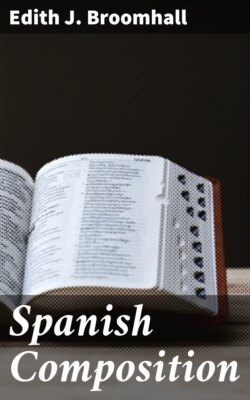Читать книгу Spanish Composition - Edith J. Broomhall - Страница 7
На сайте Литреса книга снята с продажи.
LESSON III
ОглавлениеÍndice
| Cada uno es como Dios le ha criado. [3] |
| —Pedro de Alarcón. |
6. The verb to have denoting possession is rendered tener. With auxiliary force it is haber.
I used to have it, but I have it no longer.
Lo tenía sí, pero ya no lo tengo más.
He says he has sold it, but I don't know who has bought it.
Dice que lo ha vendido, pero no sé quien lo ha comprado.
(a) To have meaning to cause to be done or made, let, is rendered by hacer followed (1) by a direct infinitive, or (2) by que with the subjunctive of indirect command.
Have them get the trunks down at once.
Hágales bajar los baúles en seguida or Haga Vd. que bajen los baúles.
I like this book very much. I will have the children read it.
Me gusta mucho este libro. Haré que lo lean los niños.
He has had a new house built for his newly married daughter.
Ha hecho construir una nueva casa para su hija recién casada.
(b) To have to denoting necessity or compulsion is translated tener que, which is followed by the infinitive.
It is raining torrents. We shall have to stay here till it stops.
Llueve a cántaros. Tendremos que quedarnos aquí hasta que deje de llover.
I can't go with you because I have to study some lessons.
No puedo acompañarle porque tengo que estudiar unas lecciones.
(c) To have on, be wearing, is rendered tener puesto, or by llevar or vestir. Puesto is an adjective and agrees in gender and number with the thing worn.
She has on a simple dress and over her shoulders a wide black lace scarf.
Viste un traje sencillo y trae sobre los hombros un amplio velo negro de encaje.—LOS QUINTERO.
They all had their hats on when they came out.
Al salir todos tenían puestos los sombreros.
7. English to be to expressing futurity coupled with a vague necessity is rendered haber de followed by the infinitive.
I have read in the papers that the president is to visit the city.
He leído en los diarios que el presidente ha de visitar la ciudad.
The teacher told us that we were to finish that lesson.
El maestro nos dijo que hubiéramos de acabar aquella lección.
8. EXERCISES
(a) 1. Aquel día había de ser glorioso para el país. 2. Yo quiero que nadie tenga noticia de nuestra conferencia. 3. Quien lo haya quebrado tendrá que remendarlo. 4. Me había ido, pero he vuelto porque tengo que hablarle a Vd. 5. Pues ya no has de ver más a Paquita. Ella se casa. 6. Lo compré esta mañana y han de entregármelo mañana. 7. Tengo que subir al palomar para dar de comer a mis palomitas. 8. Ha mandado hacer un vestido nuevo para su hijita. 9. Celebro tener el gusto de conocer a Vd. 10. Tengo una viva satisfacción en haber conocido a Vd. 11. Dígales Vd. que me traigan pronto lo que les he pedido. 12. Tendrán que acostarse en cuanto lleguen.
(b) 1. This strap is good for nothing (worth nothing). I had it in my hand and it broke. 2. The trunks will have to be at the station at three o'clock. 3. What dress are you going to wear on the train? The one that I have on. 4. Have a new strap made when you return. 5. We are to wait for them here. They have gone to look for the others. 6. The teacher had the pupil read the lesson aloud. 7. You will have to go with us because we don't know the way. 8. She had on a pair of white gloves that I had given her. 9. I am to tell her that he has broken the whip that she had made for him for his birthday. 10. I will have the letter written at once.
